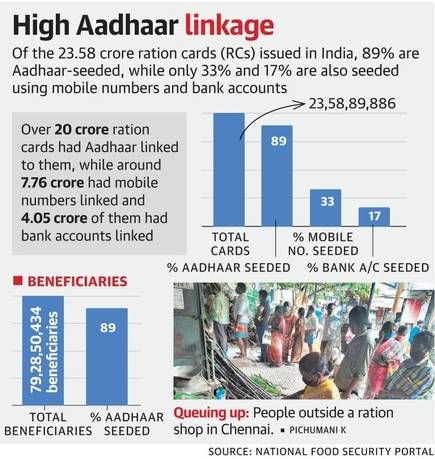- The Supreme Court recently said it was a “very serious” matter if the Centre had really cancelled around three crore ration cards, even those of tribal people and the poor, solely because they could not be biometrically linked with Aadhaar.
- A Bench, led by Chief Justice of India Sharad A. Bobde, asked the Centre to respond to the allegation made in a petition by Koili Devi, represented by senior advocate Colin Gonsalves, that such cancellations had led to starvation deaths across the country.

Technological issues:
- The insistence on Aadhaar and biometric authentication had led to the cancellation of nearly four crore ration cards in the country, according to the Union of India.
- The Union of India casually gives an explanation that these cancelled cards were bogus.
- The real reason is that the technological system based on iris identification, thumb prints, non-possession of Aadhaar, non-functioning of the Internet in rural and remote areas, etc., led to largescale cancellation of ration cards, without notice to the family concerned.
- The “petition is based on reports that an estimated two to four crore ration cards have been cancelled in the country without prior notice to the beneficiaries.
- Right to food, which the ration card symbolised, cannot be curbed or cancelled because of lack of Aadhaar.
- Koili Devi’s 11-year-old daughter, SanthoshiKumari, was allegedly a victim of hunger death in Jharkhand in 2017.
- She said the family’s ration card was cancelled due to non-linkage with Aadhaar.
- She sought an independent investigation into the starvation deaths, restoration of the cancelled ration cards and compensation for the death of her daughter.
Petitioner’s argument:
- Senior advocate said the government’s continued emphasis on Aadhaar was unfortunate as the Supreme Court had laid down in clear terms that “no insistence on Aadhaar can be done for statutory entitlements”.
- Tribals either do not have Aadhaar cards or the identification does not work in tribal and rural areas. Because of this reliance on Aadhaar cards, can you imagine three crore cards are gone.
- Starvation deaths are taking place. Advocate argued that the States were in a denial mode, blaming the deaths on diarrhoea and malaria.
- This cruel exercise deprived millions of Indians living below the poverty line of food and led to starvation deaths in Jharkhand, U.P., Odisha, Karnataka, M.P., Maharashtra, Bihar, Chhattisgarh, West Bengal, Andhra Pradesh and other States.
Defence:
- Additional Solicitor General AmanLekhi said the statements made by the petitioner side were misplaced.
- Issuance of ration card was not dependent on the Aadhaar card. Alternative mechanisms were in place.
- Besides, the issuance of ration cards was primarily the responsibility of the State governments.
- Lekhi said the petitioners should ideally move the respective High Court, rather than file an omnibus petition in the apex court.
- He said the petitioners had come directly to the apex court without raising their issue with the grievance redressal mechanism under the National Food Security Act.
- Chief Justice said we are persuaded to consider this case because of their [petitioners’] statement that ration cards have been cancelled. That is a very serious matter.
- Even as the government highlighted the redressal mechanism within the Food Security Act as the right place to go, the petitioner side countered in its report to the court that “not a single State has appointed independent nodal officers or district grievance redressal officer under the Act”.
Hunger watch report:
- All the States have mechanically granted additional designations to existing officers.
- In many cases, the officers given additional designations are from the Food Supply Department, and they are the main persons responsible for corruption in the food distribution system.
- It referred to the directions imposed by the Supreme Court in the Swaraj Abhiyan cases on the implementation of the Food Security Act, which included social audits, framing of rules and setting up vigilance committees.
- The Hunger Watch Report of the Right to Food Campaign in 2020 characterised the hunger situation in India as “grave”.
- India ranks 94 out of 107 countries in the Global Hunger Index 2020 and is in the ‘Serious Hunger Category’.
SOURCE: THE HINDU,THE ECONOMIC TIMES
 Chinmaya IAS Academy – Current Affairs Chinmaya IAS Academy – Current Affairs
Chinmaya IAS Academy – Current Affairs Chinmaya IAS Academy – Current Affairs